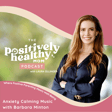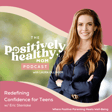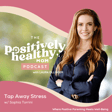
Self-Reflective Parenting | The Positively Healthy Mom Podcast with Carrie Lingenfelter
Welcome back to another nourishing episode of The Positively Healthy Mom Podcast!
In this heartfelt conversation, your host Laura Olinger is joined by Carrie Lingenfelter—speech therapist, mindful parenting advocate, and host of the Heart to Heart Parents Podcast—as they explore what it really takes to raise kids with presence and compassion, while staying connected to yourself as a parent.
Carrie shares:
✅ Her personal journey from perfectionism to presence in motherhood
✅ How childhood wounds and generational patterns show up in everyday parenting
✅ The concept of the “capacities bucket” and how to protect your energy
✅ How to shift from control to connection with your kids
✅ Simple practices like meditation, active self-care, and letting go of outside opinions
Whether you're raising toddlers, tweens, or teens, this episode is packed with powerful reflections and practical tools to support your parenting journey with more calm, confidence, and care.
🎧 Listen to Carrie’s podcast: Heart to Heart Parents
🌐 Learn more: hearttoheartlife.com
👉 If this episode resonates with you, don’t forget to like, subscribe, and share it with the moms in your circle!
Follow us for more:
📘 Facebook: Positively Healthy Coaching
📸 Instagram: @positivelyhealthycoaching
#PositivelyHealthyMom #MindfulParenting #MomBurnoutRecovery #ConsciousMotherhood #CarrieLingenfelter #HeartToHeartParents #MomSelfCareMatters #ParentingSupport #BreakTheCycle #PeacefulParenting



















